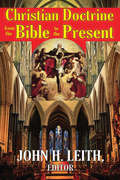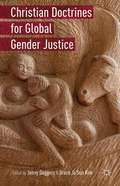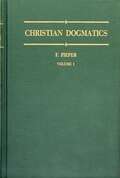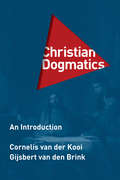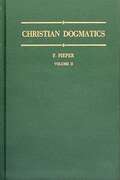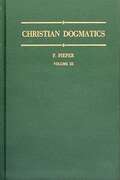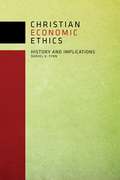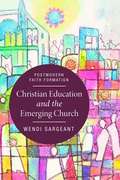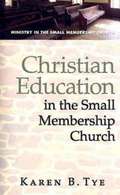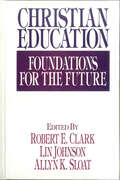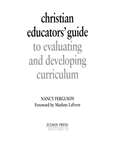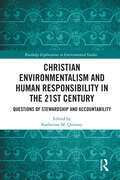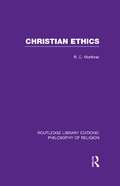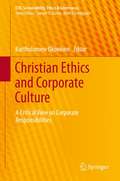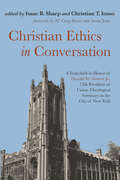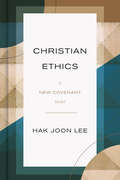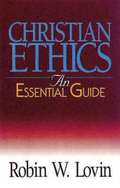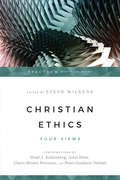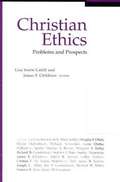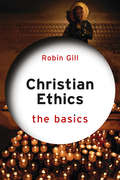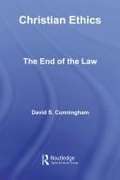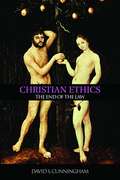- Table View
- List View
Christian Doctrine from the Bible to the Present: A Reader In Christian Doctrine From The Bible To The Present
by John H. LeithChristianity has always been a "creedal" religion in that it has always been theological. It was rooted in the theological tradition of ancient Israel, which was unifi ed by its historical credos and declaratory affi rmations of faith. No pre-theological era has been discovered in the New Testament or in the history of the Christian community. From the beginning Christianity has been theological, involving men in theological refl ection and calling them to declarations of faith. A non-theological Christianity has simply never endured, although such has been attempted, for instance, by individual seers in the sixteenth century and also by collaborators with totalitarian ideologies in the twentieth century.The creeds presented here range from the ancient faith of the Hebrews and the creed-like formulas of the New Testament to the Barmen declaration of 1934 (framed by the Christians in Germany who faced the threat of Nazism) and the Batak Creed of 1951 (in which Indonesian Christians gave authentic expression to their religious belief in the idiom of their own culture. All the creeds are in some sense "offi cial," and every major division of Christendom is represented, including the Younger Churches. The volume ends with the messages of the most important assemblies dealing with the Ecumenical Movement.This single volume, containing all the major theological affi rmations of the Christian community, is a source book for the study of Christian theology. It comprises a record of the Church's interpretation of the Bible in the past and an authoritative guide to its interpretation on the present. Indeed, it is a guide to an understanding of the Christian interpretation of life.
Christian Doctrines for Global Gender Justice
by Grace Ji-Sun Kim Jenny DaggersThis book extends the feminist theology subfield of creative imagining with traditional Christian doctrines. Whether women are welcomed into partnership and ministry or subject to exclusive male leadership, new imaginings are crucial for the twenty-first century global church. In this volume, contributors critically imagine doctrines of God, Christ, the Holy Spirit, Mary, theological anthropology, grace, free will, creativity, and hope with the aim of furthering global gender justice. As they address these doctrines and give shape to new ecotheologies, the volume's diverse set of contributors reflect on constructive projects from within their respective faith traditions. Their writings on the gospel will resonate with the concerns and projects of justice-seeking readers in a myriad of global contexts and locations.
Christian Dogmatics
by Francis Pieper Theodore EngelderA translation of Christliche Dogmatik, Volume 1 addresses: the nature and character of theology; the Holy Scripture; the doctrine of God; Creation; divine providence; angelology; doctrine of man; sin and evil; and more.
Christian Dogmatics: An Introduction
by Gijsbert Van den Brink C. Van der KooiA fresh, inviting text on the content of Christian faith in our contemporary context This one-volume systematic theology presents an accessible, orthodox overview of the Christian faith for students, teachers, pastors, and serious lay readers. Cornelis van der Kooi and Gijsbert van den Brink not only cover all the traditional themes-creation, sin, Jesus Christ, Scripture, and so on-but also relate those classical themes to contemporary developments like Pentecostalism, postfoundationalism, and evolutionary theory. Consisting of sixteen chapters, the book is ideal for classroom use. Each chapter begins with engaging questions and a statement of learning goals and concludes with a list of recommended further reading. Written in a student-friendly tone and style and expertly translated and edited, van der Kooi and van den Brink's Christian Dogmatics splendidly displays the real, practical relevance of theology to the complexities of our world today.
Christian Dogmatics: An Introduction
by Gijsbert Van den Brink C. Van der KooiA fresh, inviting text on the content of Christian faith in our contemporary context.This one-volume systematic theology presents an accessible, orthodox overview of the Christian faith for students, teachers, pastors, and serious lay readers. Cornelis van der Kooi and Gijsbert van den Brink not only cover all the traditional themes—creation, sin, Jesus Christ, Scripture, and so on—but also relate those classical themes to contemporary developments like Pentecostalism, postmodernism, and evolutionary theory.Consisting of sixteen chapters, the book is ideal for classroom use. Each chapter begins with engaging questions and a statement of learning goals and concludes with a list of recommended further reading. Written in a student-friendly tone and style and expertly translated and edited, van der Kooi and van den Brink's Christian Dogmatics splendidly displays the real, practical relevance of theology to the complexities of today&’s world.
Christian Dogmatics: Volume 2
by Francis Pieper Theodore EngelderA translation of Christliche Dogmatik, Volume 2 addresses: the saving grace of God; the doctrine of Christ, including his deity, humanity, attributes, humiliation, exaltation, and offices; and the application of salvation, including saving faith, conversion, and justification by faith.
Christian Dogmatics: Volume 3
by Francis Pieper Theodore EngelderA translation of Christliche Dogmatik, Volume III addresses sanctification, good works, christian life, means of grace, law and gospel, baptism, Lord's Supper, Christian church, public ministry, eternal election, and eschatology.
Christian Economic Ethics: History And Implications
by Daniel K. FinnDaniel Finn reviews the insights provided by a large number of texts, from the Bible and the early church, to the Middle Ages and the Protestant Reformation, to treatments of the subject in the last century. Relying on both social science and theology, Finn then turns to the implications of this history for economic life today.
Christian Education and the Emerging Church: Postmodern Faith Formation
by Wendi SargeantAll signs point to Christian education having lost its theological location and prominence in the life of the Western Protestant church. The Emerging Church movement, as an intentionally postmodern approach to ministry in the contemporary context, may, however, offer insights to reinterpret Christian education. This significant movement in today's church gives Christian education a new interpretive framework that is theologically located at an intersection of doxology and doctrine. In her examination of postmodern faith formation, Wendi Sargeant explores the importance of the Christian worshipping community as the most appropriate setting for Christian education. Practitioners and students will benefit from the ready-to-use teaching and learning matrix, and all those with interest in the formation of faith in themselves and others will draw much from the way Sargeant situates worship as the basis for enhancing Christian formation and ethos.
Christian Education in the Small Membership Church
by Karen B. TyeChristian Education is part of the vital ministry of all churches, but especially of small membership churches. In a culture that places great value on numbers, small membership churches often mistakenly see themselves at a disadvantage. Small membership churches can create wonderful opportunities to form and disciple faithful followers of Jesus Christ. In offering viable Christian Education, the role of the pastor is critical. This book invites pastors to lead their small membership churches to develop an imaginative and holistic vision of Christian Education. Read the Introduction
Christian Education: Foundations for the Future
by Edward Hayes Michael Lawson Robert Clark Craig Williford Robert Barron Valerie Wilson Julie Gorman Richard Patterson Pamela Campbell Brian Richardson Lawrence Richards Dennis Williams Cliff Schimmels Irving Jensen Marta Elena Alvarado Mark Senter III Kenneth Gangel Wayne Widder James Wilhoit Wesley Willis Warren Benson Lynn Gannett C Fred Dickason Jr Dennis Dirks Robert J. Choun Jr C Keith Mee Stanton Campbell Perry Downs Stanley Olsen Carolyn Koons Julie Hight Marlene LeFever James Plueddemann Colleen Birchett Johng Ook Lee Doris Freese J Omar Brubaker Donald Geiger Ray Syrstad Harold Westling Wesley Haystead Lowell Brown James Slaughter Wayne RickersonWhether in the home or in the church or in a Christian school, the challenge of contemporary Christian educators is to meet the academic needs of students while remaining unswerving in adherence to biblical principles. Christian Education: Foundations for the Future introduces you to the basics of a healthy Christian education program, then takes you beyond, showing you how to develop a fresh, innovative Christian education program that will revitalize your church, home, or school.
Christian Education: Foundations for the Future
by Edward Hayes Michael Lawson Robert Clark Craig Williford Robert Barron Valerie Wilson Julie Gorman Richard Patterson Pamela Campbell Brian Richardson Lawrence Richards Dennis Williams Cliff Schimmels Irving Jensen Marta Elena Alvarado Mark Senter III Kenneth Gangel Wayne Widder James Wilhoit Wesley Willis Warren Benson Lynn Gannett C Fred Dickason Jr Dennis Dirks Robert J. Choun Jr C Keith Mee Stanton Campbell Perry Downs Stanley Olsen Carolyn Koons Julie Hight Marlene LeFever James Plueddemann Colleen Birchett Johng Ook Lee Doris Freese J Omar Brubaker Donald Geiger Ray Syrstad Harold Westling Wesley Haystead Lowell Brown James Slaughter Wayne RickersonWhether in the home or in the church or in a Christian school, the challenge of contemporary Christian educators is to meet the academic needs of students while remaining unswerving in adherence to biblical principles. Christian Education: Foundations for the Future introduces you to the basics of a healthy Christian education program, then takes you beyond, showing you how to develop a fresh, innovative Christian education program that will revitalize your church, home, or school.
Christian Educators' Guide to Evaluating and Developing Curriculum
by Nancy Ferguson Marlene D LefeverThis practical handbook for pastors, lay leaders, and Christian education committees who need help choosing a curriculum that suits their churches beliefs, practices, and membership offers the tools to write ones own curriculum.
Christian Environmentalism and Human Responsibility in the 21st Century: Questions of Stewardship and Accountability (Routledge Explorations in Environmental Studies)
by Katherine M. QuinseyChristian Environmentalism and Human Responsibility in the 21st Century comprises original scholarly essays and creative works exploring the implications of Christian environmentalism through literary and cultural criticism and creative reflection. The volume draws on a flourishing recent body of Christian ecocriticism and environmental activity, incorporating both practical ethics and environmental spirituality, but with particular emphasis on the notion of human responsibility. It discusses responsibility in its dual sense, as both the recognized cause of environmental destruction and the ethical imperative of accountability to the nonhuman environment. The book crosses boundaries between traditional scholarly and creative reflection through a global range of topics: African oral tradition, Ohio artists off the grid, immigrant self-metaphors of land and sea, iconic writers from Milton to O’Connor to Atwood, and Indigenous Canadian models for listening to the nonhuman Mother of us all. In its incorporation of academic and creative pieces from scholars and creative artists across North America, this volume shows how environmental work of its nature and necessity crosses traditional academic and community boundaries. In both form and orientation, this collection speaks to the most urgent intellectual, physical, social, and spiritual needs of the present day. This book will appeal to scholars, researchers, and upper-level students interested in the relationship between religion and environment, ethics, animal welfare, poetry, memoir, and post-secularism.
Christian Ethics (Routledge Library Editions: Philosophy of Religion)
by Robert Cecil MortimerA discussion of the general presuppositions and ideas which underlie the Christian ethical teaching, treating of such subjects as conscience, the concepts of sin and virtue, and the relation between morality and religion. The book also attempts to explain the traditional Christian attitudes towards certain particular matters of conduct; for example, marriage and divorce, gambling, and the rights and duties of private property. Written by the then Bishop of Exeter, this book was originally published in 1950.
Christian Ethics and Corporate Culture: A Critical View on Corporate Responsibilities (CSR, Sustainability, Ethics & Governance)
by Bartholomew OkonkwoThe essays collected in this book discuss the contemporary practice of corporate responsibility by applying the Christian principles of the unity of knowledge and pursuit of truth to the traditional principles of justice, human dignity and the common good, to rediscover a corporate culture that will help transform our economic system and the characteristics required to build an enduring trust in economic relationships. In this volume a select group of management theorists, theologians, legal scholars, economists and ethicists jointly strive to give back to the market economy its ethical and political dimensions. They assess the quality of present day corporate social responsibility, discuss the social and environmental costs of production and argue for an agenda that can be used in modern corporations in their effort to align profitability and growth with business ethics.
Christian Ethics in Conversation
by Isaac B. Sharp Christian T. IossoInspired by Donald W. Shriver Jr.'s leadership of Union Theological Seminary (New York City), Christian Ethics in Conversation brings together essays by members of a stellar faculty--including Gary Dorrien, Larry Rasmussen, Phyllis Trible, and Cornel West--and interdisciplinary colleagues, such as Columbia University biologist Robert Pollack, Chancellor Emeritus of the Jewish Theological Seminary Ismar Schorsch, and Pulitzer Prize-winning Yale historian David W. Blight. The challenges they describe of embracing diversity while facing financial pressure and encouraging social change speak to seminaries, churches, denominations, and faithful individuals facing similar challenges today. The chapters model the kinds of interdisciplinary, interfaith, and inter-institutional conversations foundational to Shriver's approach to Christian public ethics. Shriver and Union Seminary addressed racial justice directly, and colleagues describe lessons learned from an activist-academic who was also a Southerner committed to reconciling and repairing the wounds of history. International conversation partners analyze the place of moral claims in successful social transformation, but those claims also had to be lived out in the seminary's institutional life. Gender justice, full inclusion, and liberation theologies became crucial to Union's identity, but not automatically. The changes required are described by a former dean, board member, worship leader, and several students. All the while, faculty and students of Union and its neighbors were engaged in ongoing debates about honest patriotism, friendship across division, and the dangers of uncritical nationalism, also captured by the book's contributors. With contributions from: M. Craig Barnes Serene Jones Dean K. Thompson Donald W. Shriver, Jr. Gary Dorrien Milton McCormick Gatch, Jr. Larry Rasmussen Cornel West: Janet R. Walton James A. Forbes, Jr. Phyllis Trible Robert Pollack Ismar Schorsch Hays Rockwell Thomas S. Johnson Lionel Shriver David Kwang-sun SUH Roger Sharpe Bill Crawford Robert W. Snyder Eric Mount Joseph V. Montville Helmut Reihlen and Erika Reihlen David Blight Ronald H. Stone Steve Phelps
Christian Ethics in the Work Place
by Raymond L. Hilgert Philip H. Lochhaas James L. Truesdelldiscusses how people can live a Christian life, and still be successful in today's world of modern business
Christian Ethics: A New Covenant Model
by Hak Joon LeeIn this capacious and accessible introduction to Christian ethics, Hak Joon Lee advances a renewed vision of Christian life that is liberative, grace-centered, and justice- and peace-oriented in nature. Responding to key ethical questions of today, Lee applies the moral meaning and implications of the New Covenant in Jesus Christ to twenty-first-century life, characterized by fluidity, fragmentation, division, and violence. Christian Ethics begins by introducing covenant as the central drama and storyline of Scripture that culminates in the New Covenant of Jesus. It presents shalom (the wholeness and flourishing of creation) as God&’s ultimate purpose and God&’s covenant as &“God&’s organizing mechanism of community&” that mediates God&’s work of liberation and restoration. Lee proposes a creative model of Christian ethics based on the New Covenant of Jesus and its organizing patterns, reconstructing the key categories of ethics (agency, norms, authority of Scripture, ethical discernment, etc.) and drawing out four practices—communicative engagement, just peacemaking, grassroots organizing, and nonviolence. The result is a new model of Christian ethics that is inclusive, egalitarian, ecological, and justice- and peace-oriented, which overcomes the limitations of traditional covenantal ethics. In the second part of the book, Lee systematically applies New Covenant ethics to the most urgent and controversial social issues of our time: democratic politics, economic ethics, creation care, criminal justice, race, sex and marriage, medicine, and war and peace. Through his deep, pastoral, and irenic inquiries into these difficult topics, Lee demonstrates a pattern of covenantal moral reasoning that undercuts the dominant neoliberal ethos of individualism and transactional relationship that more and more influences Christian moral decisions. His conclusion is that as covenant has been at the heart of modern democracy, human rights, civil society, and civic formation, a renewed understanding of covenant centered in Jesus can help to heal our broken society and imperiled planet, and to reorganize the fragmented human life in the era of globalization and digitization.
Christian Ethics: An Essential Guide (New Studies In Christian Ethics Ser. #20)
by Robin W. LovinIn this excellent outline of Christian ethics, Robin W. Lovin achieves a balance between the questions and issues which form the core of the study of ethics and the life situations from which those questions arise. Eschewing a sectarian approach which dismisses other understandings of the moral life, Lovin nonetheless lays claim to a specifically Christian understanding of ethics. He begins with basic Christian convictions about the reality of God and human redemption and weaves these convictions into the fabric of moral concerns that are widely shared in contemporary society. He takes note of the problems that arise when Christians try to act on or enforce their convictions in a pluralistic society and recognizes the variety of theological and moral beliefs that are held within the Christian community, as well as in the wider society.
Christian Ethics: Four Views (Spectrum Multiview Book Series)
by Steve WilkensChristian Ethics: Four ViewsBrad J. Kallenberg: Virtue EthicsJohn Hare: Divine Command EthicsClaire Peterson: Natural Law EthicsPeter Heltzel: Prophetic EthicsChristian Ethics: Four Views
Christian Ethics: Problems and Prospects
by Lisa S. Cahill James F. ChildressThis fresh analysis of the "state of the question" in religious ethics charts the course for future study and exploration in the field. Written in honor of James Gustafson, who provides a conclusion, these 22 original and tightly argued essays examine hotly debated controversies on a wide range of topics, from sources of theological ethics to the moral life. At the core of these complementary perspectives is the ever-increasing tension between the particularity of religious and philosophical traditions and the universality of moral discourse. Designed for classroom use.
Christian Ethics: The Basics (The Basics)
by Robin GillChristian Ethics: The Basics sets out clearly and critically the different ways that Augustine, Aquinas and Luther continue to shape ethics today within and across Christian denominations. It assumes no previous knowledge of the subject and can be read by religious believers and non-believers alike. Readers are introduced to Christian ethics from the ground up before being invited to consider some of the most controversial but important questions facing people across the world today. Topics addressed include: Social justice War and peace Migration/immigration Climate change Euthanasia Same-sex marriage Religiously-inspired violence Biotechnology Abrahamic ethics Concise, readable and authoritative, this is the ideal primer for anyone interested in the study of religious ethics and Christianity.
Christian Ethics: The End of the Law
by David S. CunninghamChristian Ethics provides a biblical, historical, philosophical and theological guide to the field of Christian ethics. Prominent theologian David S. Cunningham explores the tradition of 'virtue ethics' in this creative and lively text, which includes literary and musical references as well as key contemporary theological texts and figures. Three parts examine: the nature of human action and the people of God as the 'interpretative community' within which ethical discourse arises the development of a 'virtue ethics' approach, and places this in its Christian context significant issues in contemporary Christian ethics, including the ethics of business and economics, politics, the environment, medicine and sex. This is the essential text for students of all ethics courses in theology, religious studies and philosophy.
Christian Ethics: The End of the Law
by David S. CunninghamChristian Ethics provides a biblical, historical, philosophical and theological guide to the field of Christian ethics. Prominent theologian David S. Cunningham explores the tradition of ‘virtue ethics’ in this creative and lively text, which includes literary and musical references as well as key contemporary theological texts and figures. Three parts examine: the nature of human action and the people of God as the ‘interpretative community’ within which ethical discourse arises the development of a ‘virtue ethics’ approach, and places this in its Christian context significant issues in contemporary Christian ethics, including the ethics of business and economics, politics, the environment, medicine and sex. This is the essential text for students of all ethics courses in theology, religious studies and philosophy.
